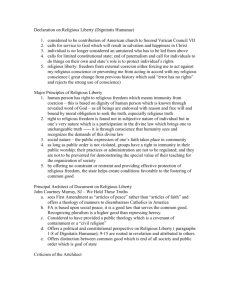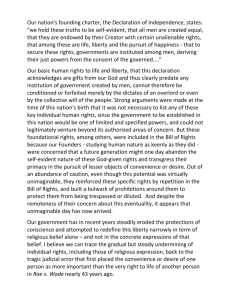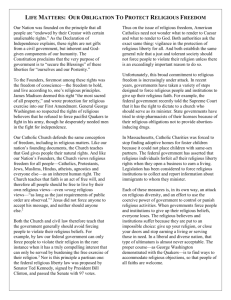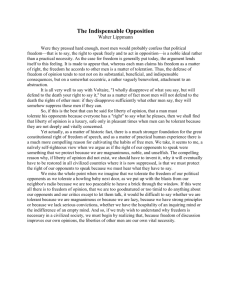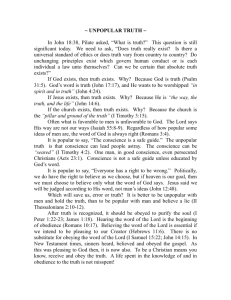The Pennsylvania Charter of Privileges—(October 28, 1701) The
advertisement
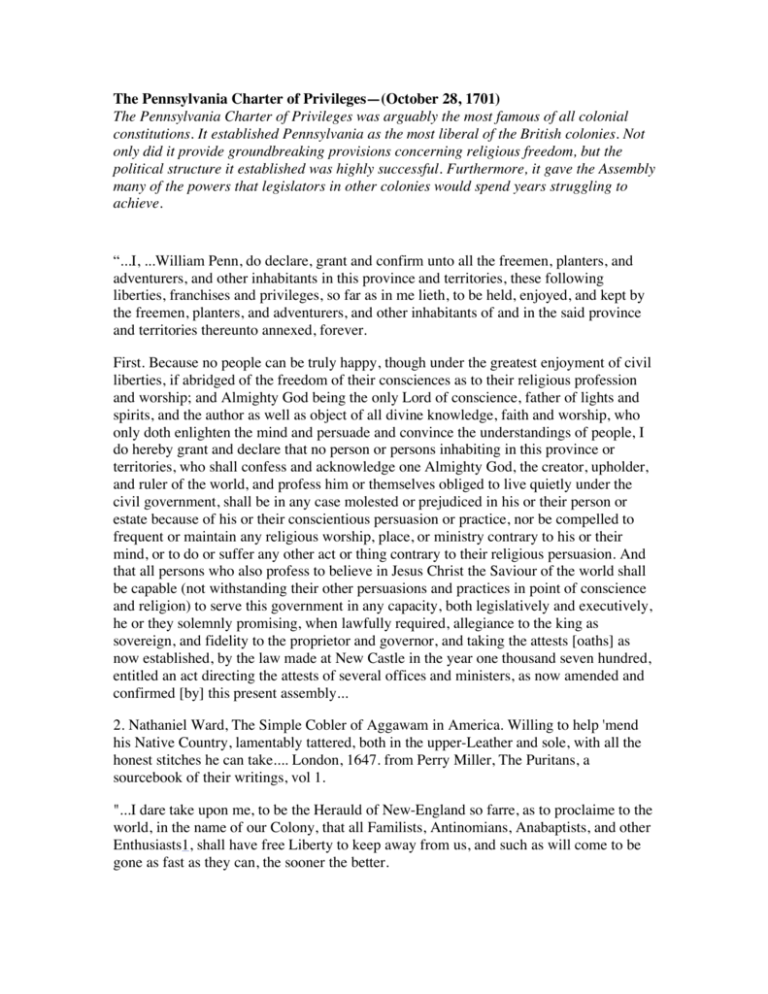
The Pennsylvania Charter of Privileges—(October 28, 1701) The Pennsylvania Charter of Privileges was arguably the most famous of all colonial constitutions. It established Pennsylvania as the most liberal of the British colonies. Not only did it provide groundbreaking provisions concerning religious freedom, but the political structure it established was highly successful. Furthermore, it gave the Assembly many of the powers that legislators in other colonies would spend years struggling to achieve. “...I, ...William Penn, do declare, grant and confirm unto all the freemen, planters, and adventurers, and other inhabitants in this province and territories, these following liberties, franchises and privileges, so far as in me lieth, to be held, enjoyed, and kept by the freemen, planters, and adventurers, and other inhabitants of and in the said province and territories thereunto annexed, forever. First. Because no people can be truly happy, though under the greatest enjoyment of civil liberties, if abridged of the freedom of their consciences as to their religious profession and worship; and Almighty God being the only Lord of conscience, father of lights and spirits, and the author as well as object of all divine knowledge, faith and worship, who only doth enlighten the mind and persuade and convince the understandings of people, I do hereby grant and declare that no person or persons inhabiting in this province or territories, who shall confess and acknowledge one Almighty God, the creator, upholder, and ruler of the world, and profess him or themselves obliged to live quietly under the civil government, shall be in any case molested or prejudiced in his or their person or estate because of his or their conscientious persuasion or practice, nor be compelled to frequent or maintain any religious worship, place, or ministry contrary to his or their mind, or to do or suffer any other act or thing contrary to their religious persuasion. And that all persons who also profess to believe in Jesus Christ the Saviour of the world shall be capable (not withstanding their other persuasions and practices in point of conscience and religion) to serve this government in any capacity, both legislatively and executively, he or they solemnly promising, when lawfully required, allegiance to the king as sovereign, and fidelity to the proprietor and governor, and taking the attests [oaths] as now established, by the law made at New Castle in the year one thousand seven hundred, entitled an act directing the attests of several offices and ministers, as now amended and confirmed [by] this present assembly... 2. Nathaniel Ward, The Simple Cobler of Aggawam in America. Willing to help 'mend his Native Country, lamentably tattered, both in the upper-Leather and sole, with all the honest stitches he can take.... London, 1647. from Perry Miller, The Puritans, a sourcebook of their writings, vol 1. "...I dare take upon me, to be the Herauld of New-England so farre, as to proclaime to the world, in the name of our Colony, that all Familists, Antinomians, Anabaptists, and other Enthusiasts1, shall have free Liberty to keep away from us, and such as will come to be gone as fast as they can, the sooner the better. "...I dare averre, that God doth no where in his word tolerate Christian States, to give Tolerations to such adversaries of his Truth, if they have power in their hands to suppresse them...." True religion "strictly bindes every conscience to contend earnestly for the Truth: to preserve unity of spirit, faith and Ordinances, to be all like-minded, of one accord; every man to take his brother into his Christian care: to stand fast with one spirit, with one minde, striving together for the faith of the Gospel: and by no meanes to permit Heresies or erroneous opinions.... "If the devill might have his free option, I beleeve he would ask nothing else, but liberty to enfranchize all other Religions, and to embondage the true; nor should he need: It is much to be feared, that laxe Tolerations upon State-pretences and planting necessities, will be the next subtle Stratagem he will spread, to distate the Truth of God and supplant the peace of the Churches. Tolerations in things tolerable exquisitely drawn out by the lines of the Scripture, and pensill of the Spirit, are the sacred favours of Truth, the due latitudes of Love, the faire Compartiments of Christian fraternity: but irregular dispensations, dealt forth by the facilities of men, are the frontiers of errour, the redoubts of Schisme, the perillous irritaments of carnall enmity. "My heart hath naturally detested foure things: The standing of the Apocrypha2 in the Bible; Forrainers dwelling in my Countrey, to crowd out native Subjects into the corners of the Earth; Alchymized3 coines; Tolerations of divers Religions, or of one Religion in segregant shapes; He that willingly assents to the last, if he examines his heart by daylight, his conscience will tell him, he is either an Atheist, or an Heretique, or an Hypocrite, or at best a captive to some lust.... "Not to tolerate things meerly indifferent to weak consciences, argues a conscience too strong: pressed uniformity in these, causes much disunity. To tolerate more than indifferents, is not to deale indifferently with God; He that doth it, takes his Scepter out of His hand, and bids Him stand by. The power of all Religion and Ordinances, lies in their purity: their purity in their simplicity: then are mixtures pernicious. I lived in a City, where a Papist Preached in one Church, a Lutheran in another, a Calvinist in a third; a Lutheran one part of the day, a Calvinist the other, in the same Pulpit; the Religion of that place was but motly and meagre, their affections Leopard-like. "If the whole Creature should conspire to doe the Creator a mischiefe, or offer him an insolency, it would be in nothing more, than in erecting untruths against his Truth, or by sophisticating his Truths with human medley's: the removing of some one iota in Scripture, may draw out all the life, and traverse all the Truth of the whole Bible; but to authorise an untruth, by a Toleration of State, is to build a Sconce against the walls of Heaven, to batter God out of his Chaire: To tell a practicall lye is a great sinne, but yet transient; but to set up a Theoreticall untruth, is to warrant every lye that lyes from its root to the top of every branch it hath.... "That State is wise, that will improve all paines and patience rather to compose, then tolerate differences in Religion. There is no divine Truth, but hath much Celestiall fire in it from the Spirit of Truth: nor no irreligious untruth, without its proportion of Antifire from the Spirit of Error to contradict it: the zeale of the one, the virulency of the other, must necessarily kindle Combustions. Fiery diseases seated in the spirit, embroile the whole frame of the body; others more externall and coole, are lesse dangerous. They which divide in Religion, divide in God; they who divide in him, divide... where there is no reconciliation, without atonement; that is, without uniting in him, who is One, and in his Truth, which is also one..... "Concerning Tolerations I may futher assert. "That Persecution of true Religion, and Toleration of false, are the Jannes and Jambres to the Kingdome of Christ, whereof the last is farre the worst.... "He that is willing to tolerate any Religion, or discrepant way of Religion, besides his owne, unlesse it be in matters meerly indifferent, either doubts of his owne, or is not sincere in it. "He that is willing to tolerate any unsound Opinion, that his owne may also be tolerated, though never so sound, will for a need hang Gods Bible at the Devills girdle. "Every Toleration of false Religions, or Opinions hath as many Errors and sinnes in it, as all the false Religions and Opinions it tolerates.... "That State that will give Liberty of Conscience in matters of Religion, must give Liberty of Conscience and Conversation in their Morall Lawes, or else the Fiddle will be out of tune, and some of the strings cracke.... "Experience will teach Churches and Christians, that it is farre better to live in a State united, though somewhat Corrupt, then in a State, whereof some Part is Incorrupt, and all the rest divided."... "Concerning Novelties of opinions; I shall expresse my thoughts in these briefe passages. First, that Truth is the best boone God ever gave the world.... Secondly, the least Truth of Gods Kingdome, doth in its place, uphold the whole kingdome of his Truths; Take away the least vericulum [truth] out of the world, and it unworlds all, potentially, and may unravell the whole texture actually, if it be not conserved by an Arme of extraordinary power. Thirdly, the least Evangelicall Truth, is more worth than all the Civill Truths in the world, that are merely so. Fourthly, that Truth is the Parent of all Liberty whether politicall or personall; so much untruth, so much thraldome, John 8.32. "Hence it is, that God is so jealous of his Truths, that he hath taken order in his due Justice: First, that no practicall sin is so sinfull as some errour in judgement; no men so accursed with indelible infamy and dedolent impenitency, as Authours of Heresie. Secondly, that the least Error, if grown sturdy and pressed, shall set open the Spittledoore of all the squint-ey'd, wry-necked, and brasen-faced Errors that are or ever were of that litter.... Thirdly, that, that State which will permit Errors in Religion, shall admit Errors in Policy unavoydably. Fourthly, that that Policy which will suffer irreligious errors, shall suffer the losse of so much Liberty in one kind or other...."... "How all Religions should enjoy their liberty, Justice its due regularity, Civill cohabitation morall honesty, in one and the same Jurisdiction, is beyond the Artique of my comprehension...." Document Analysis Discuss Penn’s approach to religious toleration.According to Penn, people can be truly happy only under what condition? What are the four things that Penn specifies he “naturally detested”? 1 Religious groups whose beliefs seemed heretical to mainline Massachusetts Puritans.2 Certain books of the Bible, some of which Catholics accepted, that Protestants considered uncanonical and so illegitimate because they were not part of the Hebrew Scriptures.3 An old form of chemistry that attempted to transform base metals into gold.
